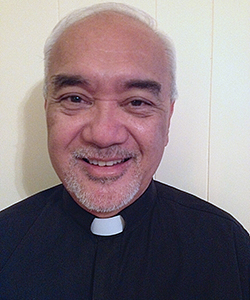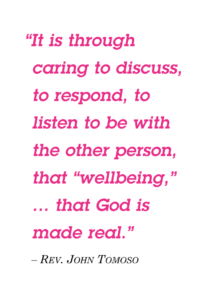Listening, responding, caring—the embodiment of our spirituality.
 The Rev. John A.H. Tomoso †
The Rev. John A.H. Tomoso †
Spirituality is part of the make-up of every person. Our spiritual being as individuals is why we not only have respect for life but also why we respect the dignity of every human being. I believe that the spirituality of each person is a sign of God living not only around us but within us.
Recently as part of my continuing education as a Priest, I took a class on Pastoral Care. The class, which lasted from March through the end of June of this year, took me and my cohort through a curriculum whose theme was about “listening, responding and caring,” with the idea that the dignity of the person never goes away; is never lost. It is said that the “caring of souls” is a priest’s most sacred duty. Thus, the class imparted on me the idea that as a priest, I care “for all sorts and conditions” of persons with spiritual care and sustenance. Of course, “spirituality” soon became the lens through which all in the class came to understand about how individuals come to know about their relationship to God and God’s relationship to them.
In my short life as a priest (I celebrated the second anniversary of my Ordination to the Priesthood on July 30th), it has been my joy, privilege and delight to comfort, assure and nurture individuals who want to know that God, in their lives, is real. As the class reiterated often enough, God is sustained and made real through the “spiritual being” of the individual. Those in the class, recounted and reacted to the stories shared about how listening was the best way to engage the spirituality of the person. We were reminded that this type of listening is attuned to the present and strives to be objective. You know, I believe God is always this way. He knows our present (and our past and our future) and is always objective.
Responding to the individual, when engaging in spiritual and pastoral counseling, I know it is important to always let the individual take the lead, so as to facilitate his or her “inner being” being allowed to “show the way to God and the divine presence” that is the essence of one’s spirituality. I think about how I’ve responded to others as a Social Worker of forty-two years of practice and I find it similar to how I am responding to others as a Priest for two years. The class instructor kept reminding us that one should never “get ahead” of the person being listened or responded to but to “hover” and “go along side with” the person.
I do find that when I am in pastoral situations in which the spirituality of the individual is being engaged, there is a somewhat natural tendency for me to be caring to that individual because I know that God cares. This may sound trite but I believe that in most of my pastoral counseling opportunities, individuals want to know that others care. As a priest, I want to let individuals know that caring brings out the best of one’s spirituality because God cares. The Pastoral Counselor—the Priest—is an instrument of the care of God.
 In listening and responding to the spirituality of every person who comes to me for counsel, I try to help each one to bring meaning and significance to their “inner being,” their spirituality, and their connection with and to God. It is through caring to discuss, to respond, to listen to be with the other person, that “well-being,” i.e. the wholeness of both the physical and spiritual self, that God is made real. So, kababayan, let us listen, respond and care in our daily lives. In all we do, think, and say, God is made real. I believe that it is our dignity, our spirituality that makes it so! In listening, responding and caring for each other, our respect for each other, God is made real and is manifest in, around and through each of us.
In listening and responding to the spirituality of every person who comes to me for counsel, I try to help each one to bring meaning and significance to their “inner being,” their spirituality, and their connection with and to God. It is through caring to discuss, to respond, to listen to be with the other person, that “well-being,” i.e. the wholeness of both the physical and spiritual self, that God is made real. So, kababayan, let us listen, respond and care in our daily lives. In all we do, think, and say, God is made real. I believe that it is our dignity, our spirituality that makes it so! In listening, responding and caring for each other, our respect for each other, God is made real and is manifest in, around and through each of us.
Have an idea or a comment or even a question, contact me at this email address: atingkabuhayan@gmail.com Until my next column, please take care!
Rev. John A. Hau’oli Tomoso † is a Social Worker and Episcopal Priest. He is a Priest Associate at Good Shepherd Episcopal Church in Wailuku and an on-call Chaplain at Maui Memorial Medical Center. Tomoso was graduated from St. Anthony Jr./Sr. High School, the College of St. Thomas in St. Paul, Minnesota (Bachelor of Arts in Political Science and Sociology) and Myron B. Thompson School of Social Work at the University of Hawai’i at Mānoa (Masters of Social Work). In 2008, he retired from the civil service as the Maui County Executive on Aging. Tomoso is currently the Executive Director of the non-profit Tri-Isle Resource Conservation and Development Council, Inc. His wife Susan is a 7th grade Language Arts Teacher at Maui Waena Intermediate School.
